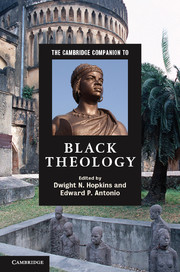Book contents
- Frontmatter
- Part I Introduction
- 1 General introduction
- 2 Historical perspective
- 3 Black theology and liberation theologies
- 4 The social sciences and rituals of resilience in African and African American communities
- 5 Black theology and womanist theology
- Part II Themes in black theology
- Part III Global expressions of black theology
- Further reading
- Index
- Other titles in the series
4 - The social sciences and rituals of resilience in African and African American communities
from Part I - Introduction
Published online by Cambridge University Press: 28 September 2012
- Frontmatter
- Part I Introduction
- 1 General introduction
- 2 Historical perspective
- 3 Black theology and liberation theologies
- 4 The social sciences and rituals of resilience in African and African American communities
- 5 Black theology and womanist theology
- Part II Themes in black theology
- Part III Global expressions of black theology
- Further reading
- Index
- Other titles in the series
Summary
INTRODUCTION
This chapter has several goals. First, it seeks to show how the social sciences can make a positive contribution to theology. In the process of achieving this goal I will also examine why theology has, until fairly recently, failed to make constructive use of social scientific methods. Second, I will show that the emergence of a variety of liberation theologies, with their strong commitment to the social and to social reality, represent an important opportunity for theology to engage the social sciences. Third, I will seek to apply the social sciences, and particularly my own discipline of social anthropology, to theology by investigating the responses of two different marginalized communities to social and political oppression. The first is a black South African community in the township of Guguletu, just outside Cape Town, and the second is an African American community on the South Side of Chicago. Over the course of analyzing these communities, I will appropriate the social sciences to theologize within a womanist framework. In other words, I take womanism as both an organizing experience and as a fundamental social category through which to deploy the social sciences in and for theology.
I begin with the claim that historically and presently, traditional academic theological inquiry does not adequately address issues and methodologies related to the social sciences. I will argue that the presence of African American male and womanist theologians, collectively with feminist, Latin American, Asian, and queer theologians, has begun to introduce social, historical, political, cultural, and economic issues into the formal field of theology.
- Type
- Chapter
- Information
- The Cambridge Companion to Black Theology , pp. 44 - 57Publisher: Cambridge University PressPrint publication year: 2012



